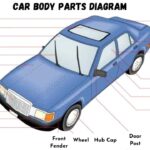Thinking about a career in the automotive industry? Car Dealership Parts Department Jobs might be on your radar. It’s a field with its own unique rhythm and demands, and understanding what it’s really like can help you decide if it’s the right path for you. Let’s dive into an insider’s perspective on this often-overlooked but crucial part of the dealership world.
For many, the parts department might seem like a back-office operation, less glamorous than sales or service. However, those in the know understand that the parts department is the backbone of any successful dealership. Without a well-functioning parts team, dealerships would quickly find themselves in trouble. The truth is, the parts department is a dynamic environment with a lot more going on than meets the eye.
Someone with years of experience in dealership parts departments, including time spent as a service technician, can offer valuable insights. Starting in the business in 2004, their journey began as a back counterman and shipping/receiving clerk, eventually progressing to an assistant manager role at a VW dealership. This experience spans various dealership settings, from smaller, budget-conscious operations to larger dealerships with luxury brands like Audi and Porsche.
The stereotype of parts department staff lounging around and being grumpy isn’t entirely unfounded, but it’s far from the whole picture. A significant part of the job involves high-volume wholesale parts sales, supplying parts to the very online retailers where many car enthusiasts purchase their components. This means managing relationships with repair shops, body shops, wholesale vendors, and ensuring timely deliveries. Juggling these responsibilities while also supporting the dealership’s service department keeps things fast-paced and challenging.
Compensation in car dealership parts department jobs can vary. Smaller dealerships with a focus on cost-cutting may not offer the most competitive salaries. In this particular experience, earnings averaged around $55,000 annually, including commission, in a high-cost-of-living area near the NYC metro. While this is a decent income, it’s noted that the profitability of parts departments has shifted over the years, with a greater proportion of pay now coming from salary rather than commission. Larger dealerships, especially those handling luxury brands, may offer more lucrative compensation packages.
However, the financial aspect isn’t the only factor to consider. Dealership parts department jobs often come with attractive perks. These can include substantial discounts on parts, access to shop facilities for personal vehicle maintenance, and shorter commutes. The value of a positive work environment and a good team should not be underestimated. Sometimes, a slightly lower salary is a worthwhile trade-off for job satisfaction and a better quality of life.
Considering the evolving landscape of the automotive industry, with changes impacting dealership profitability, it’s wise to weigh your career options carefully. While car dealership parts department jobs offer a solid entry point into the automotive world and can be rewarding, especially for those who enjoy problem-solving and working with cars, it may not be the most financially lucrative path long-term. Exploring roles like service advisor or considering professions outside of dealership parts and service might be worth considering for those seeking maximum earning potential and career growth in the automotive sector.
